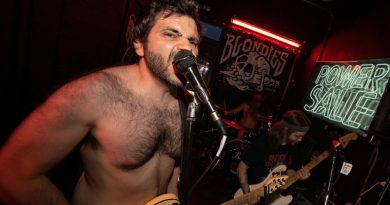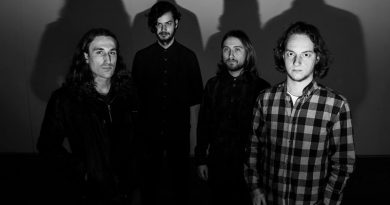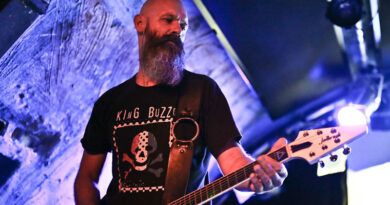Light Screamer Interview With Ida, Jens & Johan
Light Screamer are a power trio from the city of Örebro, the 6th largest city in Sweden and have been in existence since 2011. Currently consisting of Ida Andersson-Norrie, Jens Hellman and Johan Kekki, who recently replaced Peter Lindström after the recording of Reap, they create a bracing and exciting form of Riot Girrl influenced noise-rock and post-punk.
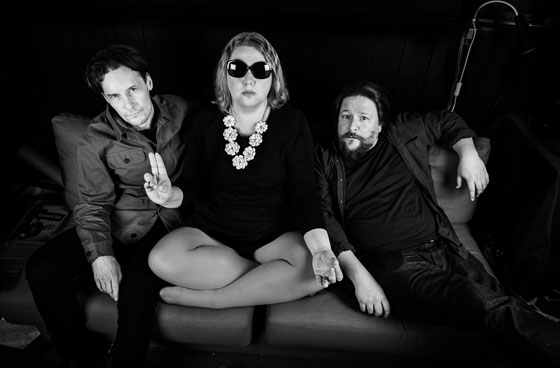
As for the aforementioned album Reap, it was released on 12th June on Nominata Records, which I had the great privilege of reviewing, and the band kindly took some time out to answer a few of my questions.
Hi guys, welcome to The Sleeping Shaman. Please could you give the readers a brief history of how the band formed and bands you were in previously etc.
Ida: Hey Reza, thank you! Jens and Peter had played in a band called The Advisors and talked to Tobias about forming a new band. Originally, there was someone else who were supposed to play bass but that fell through and I joined instead. This was in 2011, Tobias and I were living together at the time so I had heard all about the forming of the band already. I had played in a bunch of punk/alternative bands in my teens but had only done solo stuff since. It was pretty much the same story for Tobias who had put out a few albums under his solo project Daisy Pusher (named after the Cherubs song) in the years leading up to the formation of Light Screamer.
Johan: I’ve played drums and written music pretty much all my life, and pretty much in all different music styles. Other bands worth mentioning include: Cirkus Frax, Innospecific Order, and Earthman, Go Home!.
I was intrigued as to how you came by the band name; it definitely screams (pun intended) noise-rock but how did you decide on it? Were there any other names under consideration before you came upon Light Screamer?
Ida: I think we had a bunch of different suggestions but ended up with Light Screamer since everyone thought it sounded ok – it kind of gave an idea about what the music might be and didn’t sound too pretentious J I guess we, as a band, tend to choose album and song titles that are open for interpretation. For me, the same goes for my lyrics. We often have an idea behind it but that may not be what the listener picks up.
Jens: We also liked the idea that “Light Screamer” doesn’t mean anything.
Your latest album ‘Reap’, in comparison to your previous efforts ‘Gauss’ and ‘Switch’ feels a little more refined and less discordant, was this a conscious decision? Or just part of a natural evolution?
Jens: I think the way you experience Reap is a consequence of the reforming of the band. Ida’s vocals, the ‘fat’ bass and drum section and more dynamic guitars as parts of the sound was a conscious decision. Even though the song writing process is quite like before, everything is written in another context and the guitars are written and played from a new stance. My way of playing the guitar in the band has changed a lot. This time, I’ve spent a lot more time writing the guitars as well as more complete song ideas.
Ida: I see it as a natural progression where our debut, Gauss, is the grittiest and Switch is more refined. When we transitioned into a three-piece, the sound became cleaner from losing one guitar and me doing all the vocals. We never really sat down and said ‘OK, let’s do this or that for the next album’ – we might have tried to do that, but the songs just end up the way they end up. We write a lot when in the rehearsal space, so I guess the state-of-mind on the day plays a big part. The process behind a heavier song like Stop or a more melodic song like Hunted is basically the same – I come up with a bass line and Jens and Peter joined in, after playing that over and over, I usually add whatever vocals that come to mind and eventually a structure takes place. Jens usually brings songs that are more finished though.
Johan: A comment from the sideline, I’ve been following the progressions of the band since the start, when I joined I was really looking forward to hearing what they’d pull off as a three-piece in the studio, and was thrilled when I first heard it. It kind of felt like they were cautiously zoning the terrain in front of them as a trio, while at the same time having this kind of ‘never look back’ confident mentality. I thought it was awesome!
We never really sat down and said ‘OK, let’s do this or that for the next album’ – we might have tried to do that, but the songs just end up the way they end up…
In my review of ‘Reap’ I picked up influences from US noise-rock, Riot Girrl and post-punk. Which artists from those scenes inspired you? Are there any artists you listen to that may prove unexpected? Is there a secret collection of Tori Amos records laying about for example?
Jens: We want Light Screamer to be original and genuine. I think we are quite eclectic about what’s inspiring us. During the process of rehearsing, writing and recording Reap, I got back into bands and music I had been away from for many years and listened to it in a completely different way. So, indirect and direct inspiration come from Gang Of Four, Bauhaus, Killing Joke, Siouxsie And The Banshees, Chrome, The Smiths, The Fall, Wire, Birthday Party, Television, Magazine, Cure and more new wave and post-punk bands. I often go back to Daniel Ash’s and John McGeoch’s willful way of doing the guitar work.
Noise-rock bands that have had an impact on me musically at the time are, for example, Retox, Fucked Up, Future Of The Left, Mclusky, Pissed Jeans and related bands as Fugazi, Swans, Big Black, Savages and Hot Snakes. Speaking about Riot Grrrl, I also love Le Tigre. Maybe a bit more of a surprising inspiration is stuff from the psychedelic and krautrock eras, bands like Amon Düül II and Faust. I also get good repetitive, meditative vibes, and a few delay feedback ideas, into our music through listening to 70s dub music like King Tubby, Aggrovators and more.
Another part of our song writing on Reap I like a lot is the ‘having fun with music history dimension’, like putting a misplaced Roky Erikson inspired solo in the middle of a noise/punk song – and actually getting it to work. Important also, for me and the whole band, I think, is the spiritual and practical inspiration from ‘punk ideology’, in the way of playing and writing music. For me, bands like Conflict, Flux Of Pink Indians and Crass are present on Reap that way.
Ida: There are some bands that we all listen to a lot like Jesus Lizard, Scratch Acid, Butthole Surfers, Sonic Youth, Shellac, Melvins, and Viagra Boys. Then there are some bands that some of us listen to more. For me, it is a bunch of US noise bands, mainly from Austin in the 90s/00s, like Crust, Ed Hall, Cherubs, Gorch Fock, Distorted Pony, Toxic Water and Oh, Beast. I grew up listening to what my dad listened to and that spanned from The Beatles to Black Sabbath and Elvis Costello – I still have many of those influences with me. In my teens in the 90s, grunge and Riot Grrrl played a big role in forming my music taste – I listened to a lot of Mudhoney, Hole, Babes In Toyland, Sonic Youth, and Nirvana. When Reap came about, some of the bands that were on repeat were Oranssi Pazuzu, Run The Jewels, Surfbort, Sleep, ShitKid, The Smiths, Rättens Krater, Jay Reatard, and Flying Burrito Brothers. I’m not sure if that comes through, though…
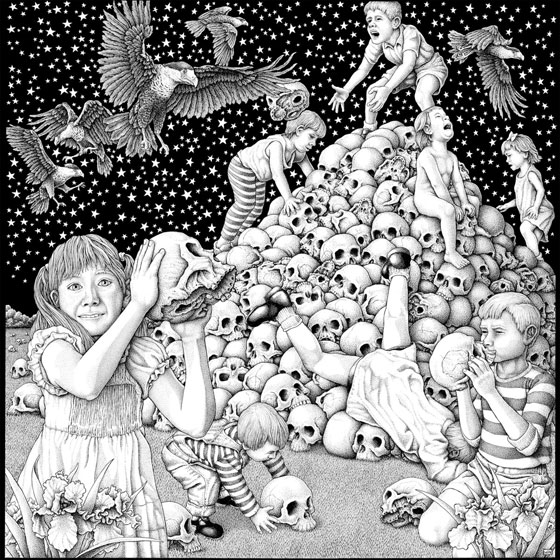
The legendary Brett Bradford of Scratch Acid makes an appearance on the track ‘Dawn’, how did your association with him come about?
Ida: Tobias was extremely into the whole Austin music scene and collected most of their records. In order to get a hold of records and more information, he got in touch with a bunch of people in Austin in the early 00s. That’s how he got to know Brett and when me and Tobias went to Austin for the first time in 2010, we stayed with Brett and his family and did so for several years after that, so they’re like an extended family.
Jens: When Light Screamer played SXSW in 2013, Peter and I also got to know Brett and many other people in the Austin music scene. During the making of Reap, Peter suggested we involve Brett and we loved the idea. So, we got in touch with him and fortunately he was on board straight away.
Light Screamer were at one point a four piece and following the departure of Tobias Eriksson (after the release of Switch) became a trio. Was there a reason behind why you didn’t replace Tobias? What are some of the key differences you have noticed since slimming down to a three-piece?
Ida: We wanted to see if we could keep going as a three-piece with the remaining original members, so we started practicing some of our existing songs and adjusted them, which worked out fine. Pretty soon, we started doing new songs and found that it worked really well with just the three of us, so we didn’t look for a replacement.
Jens: When Tobias left, we all thought a lot about the next step. We had, after the decision of continuing as a trio, a conversation about putting Ida and Ida’s vocals more in front, together with an even heavier bass and drum section where the guitar could work more freely. We have, since the start, been shaping and experimenting with the guitars through different effects, delays and loops, but as a trio, it’s dynamic in another way – very inspiring, loads of fun for me, and my guitars are a lot more elaborate now. Tobias was also a big part of the song writing, so since he left, different ideas have gotten more space. It is also a different situation on stage.
We have, since the start, been shaping and experimenting with the guitars through different effects, delays and loops, but as a trio, it’s dynamic in another way…
Johan – you’re a recent addition having signed up last year, what was it about the group that persuaded you to join? Had they been on your radar previously? For Ida and Jens, what was it about Johan that made up your minds that he was the best fit for the band?
Johan: Light Screamer had most definitely been on my radar. I’ve seen them live plenty of times and my band, Innospecific Order, have played a few shows together, including the release party for Gauss. Tobias has also done a couple of guest-appearances on stage with Inno and so on. The bands have been friends pretty much for the last decade or so. Why they asked me… well, I like to think it’s because I’m such a perfect match, but it’s probably more of a convenient nature, I guess. Me, Ida and her husband Kalle play together in Earthman Go Home and have our rehearsal-studio in same building, so you could say when Peter moved out of town it was more of a ‘hey, could you remove all that stuff in that corner to make room for all Jens’ gears, you’re playing with us from now on’ than it was ‘do you wanna play with us?’ Haha!
Ida: Since I play and hang out with Johan several days a week it was a very natural thing to ask him to join. Johan has a good understanding for the type of music we make, and I think he’s a really good drummer that will bring something different to the table.
Jens: Yeah, Johan was interested, very engaged, a great drummer and when we started to rehearse, I really had a kick!
I consider myself something of an amateur art buff, with amateur being the operative word. I’m a big fan of the artwork on all 3 full length albums by Austin artist Win Wallace. It’s visually striking, being both disturbing yet beautiful simultaneously. It’s clear you have a good working relationship with Win, is there a particular concept in mind when it comes to the designs of your albums? How does the collaborative process work with him?
Ida: Win is also someone Tobias knew from the Austin scene since he’d played with Gorch Fock. We got to know Win better when visiting Austin and have always loved his art. We thought his style and expression would suit Gauss really well so we asked Win if he’d be interested in doing the cover and were really glad that he was. We gave Win some keywords and an overall idea of what the album represented for us. Based on that and the music, Win did a cover and we were really thrilled about how well it suited and complemented the music. The process has been the same for Switch and Reap. In my mind, the three albums form a sort of trilogy and the artwork really helps to emphasize that.
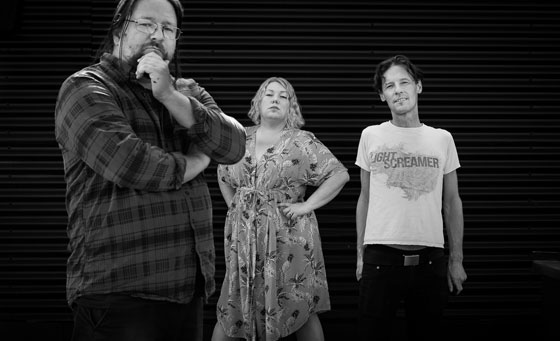
What is the music scene in Örebro like? Are there plenty of decent venues where you can play? Or is it a case of having to commute to bigger cities such as Stockholm and Gothenberg to allow for greater exposure and opportunities?
Jens: At the end of the 90s, when I moved to Örebro, the city had a boiling underground scene, with several venues, clubs, great shows with several bookers, a lot of bands and more or less important labels. It’s not like that anymore. When it comes to live music in general, it’s still good and an ambition for underground music exists, but a lot has changed. It’s a bit cyclical though and I hope we can get things going again. If you want a bit more attention, which is essential, you’ve got to reach Stockholm, Gothenburg and Malmö.
Johan: Örebro is a kind of small city with 150k citizens in a region of approx. 300k, and the number of venues varies from year to year – from 3-5 decent places some years and up to 10 other years, depending on interests from club owners and people willing to take the time to organize stuff. But I’d say a Swedish band, regardless of what genre they’re playing, HAS to look elsewhere. Next town, next region, the rest of the world.
The audience they find in Sweden is too small. Take our locals Spetznas and Millencolin, filling arenas around the world with what they do, then they come back here and perhaps on a sunny day with the wind in their backs, decent beer prices and on salary day can fill a park a two, but after that it’s back to the same clubs and audiences as we’re playing for. And also back to their day jobs…
Ida: Örebro is something of stoner-capital with bands like Dead Man, Asteroid, Witchcraft, Troubled Horse, Truckfighters and bands like Blues Pills and Graveyard with roots in Örebro. There is also lots of great music in other genres, so I guess we just take it for granted that we’re surrounded by really great local bands and most of us know each other since Örebro is a relatively small town. I think we also see more bands outside of our preferred genre because it’s a smaller town. That’s something I really like since you get to appreciate good music for what it is.
Sweden is perhaps best known for the extreme metal scene with groups like Entombed and Dissection as well as Hardcore Punk outfits like Refused and Wolfbrigade. Are there any lesser known outfits that readers should be aware of that you could recommend?
Ida: My favorite band in Sweden are Rättens Krater, they are way too underrated but have great albums and some amazing videos. Check out the videos to Huggormshålet and Baksug! I would also recommend Brainbombs who are probably more known outside of Sweden than they are here. Within noise rock, Viagra Boys have really made a name for themselves but I would recommend Pig Eyes, which feature a couple of members from Viagra Boys. ShitKid is another band with some hype that I really enjoy. I also listen quite a bit to the stoner bands from Örebro that I mentioned previously.
Jens: Commonly said, and I totally agree – Union Carbide Productions and Cortex. Mattias Alkberg’s different projects, INVSN, Nitad, Masshysteri, Franska Trion are great bands. New, lesser known, bands I listen to now are Pascal, Pablo Matisse, Beverly Kills, True moon and Eterkropp. I also love Rättens Krater and think ShitKid are exactly what the macho, male dominated music business need. Iceage rules (from Denmark, though).
Johan: Perhaps not lesser known, but your readers need to be aware of Meshuggah and everything Morgan Ågren. Other than those… I’d say Henry Fiats Open Sore.
I hope we can tour after corona but it might take some time since it’s not really an idea to start planning before we know when all this might be over…
Once the Coronavirus situation clears will you be belatedly touring ‘Reap’, or is more recording on the cards?
Ida: I hope we can tour after corona but it might take some time since it’s not really an idea to start planning before we know when all this might be over. Maybe we’ll have a new record before that happens… During 2020, we’ve focused on rehearsing songs from Reap and Switch with Johan. We have a live recording that will be available soon. Now it’s time for us to start writing new songs and finding out how new Light Screamer sounds.
Johan: What she just said.
Finally thank you for taking the time to do this interview. A frivolous question to finish things off, if you could be a member of any band from throughout history who would it be and why?
Ida: Thank you! Oh, that’s a really hard question… It would probably be The Beatles because, for me, they were geniuses who shaped the future of music. It would probably be extremely tiresome to be a member of The Beatles, releasing two albums per year and touring extensively, but the lads had a great sense of humor and if I were ever down, just talking to Ringo would probably make me happy.
Jens: Thanks! The punk explosion religiously saved me and that has affected me in many ways through all my life. It also changed music and music industry fundamentally, people and society too. That is something to be a part of! I think The Clash embodies this movement, also politically and close to me – so it would be The Clash.
Johan: Yeah, thanks! Hm… I’d like to play with Frank Zappa. I’d probably not last long as a member, haha, but so much music that formed me I guess has sort of sprung out from his ideas and his bands. He is a great inspiration and I have a lot of respect for him.
Label: Nominata Records
Band Links: Official | Facebook | Bandcamp | Twitter | Instagram
Interviewed by: Reza Mills

